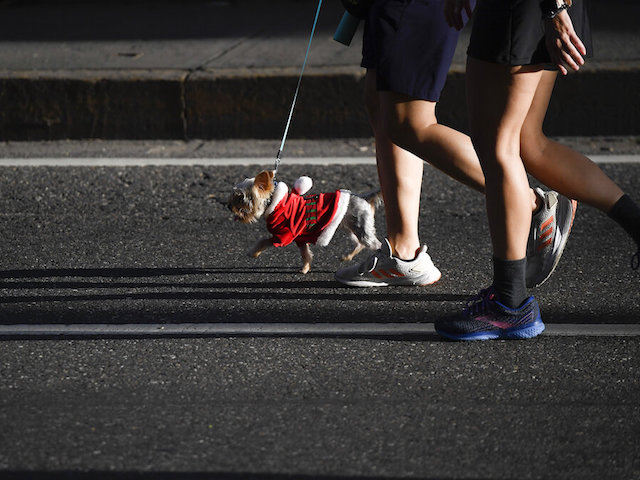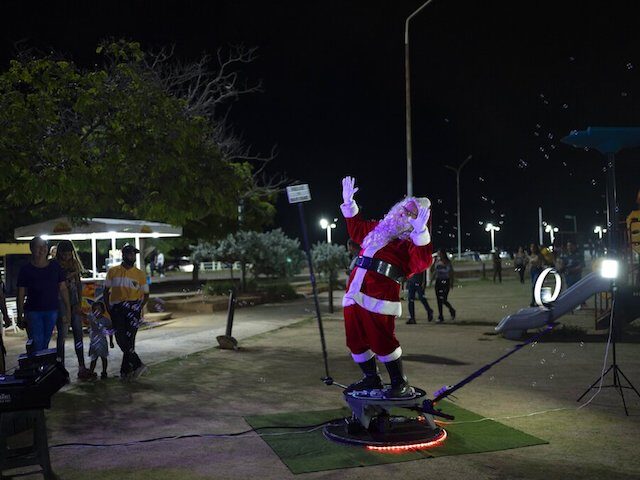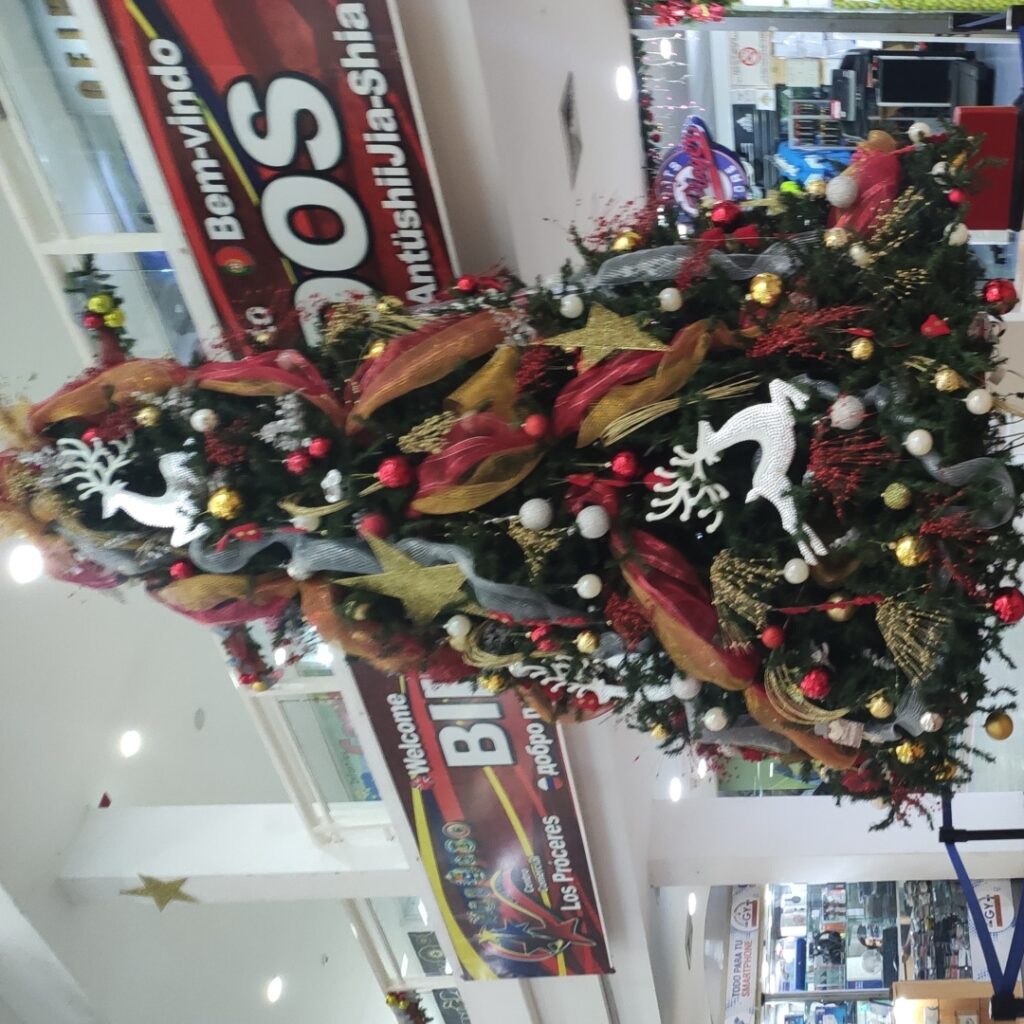CARACAS — Venezuela has once again shrouded itself in Christmas joy as we citizens prepare for Saturday to celebrate the birth of Jesus Christ with our families, friends, and loved ones.
After two very convoluted years on the endless roller coaster of Venezuela’s economic collapse and incoherent Chinese coronavirus civil rights restrictions, this, diminished as it may be, is the closest thing we have had to a “normal” Christmas in years.
The socialist regime of dictator Nicolás Maduro has yet to declare the pandemic over, or even formally loosen restrictions, but it is not enforcing them, either.
But nothing is ever so straightforward here. Venezuelans still face the country’s currency taking yet another nosedive over the past days, continued inflation, more and more families separated by the ongoing migrant crisis, and the ever present reality of the rule of the Maduro regime. Celebrating Christmas as we once used to remains elusive for many.
As with almost everything in this country these days, your ability to celebrate Venezuelan Christmas is almost entirely determined by your access to the U.S. dollar. Without access – either through remittances or work with private or foreign employers – to the once demonized “capitalist” dollar, buying celebratory items is near impossible, as the Venezuelan bolívar rots faster than unrefrigerated milk.
For the third time in a row, Maduro decreed in August that Christmas was to begin on October 1. You may be wondering, “Christmas, in October? Why, and for what reason?”
The answer is very simple: Because they can and they want to.
Venezuelans have become largely desensitized to the weirdness of Christmas in October, given the onslaught of bizarre situations the regime’s incompetence and cruelty have created. I personally only remembered that the socialist regime now chooses when Christmas begins because of the early decorations that they began to put up towards the end of September.
On September 30, I accompanied one of my young cousins as she carried out some personal errands in a mall owned and operated by the Venezuelan armed forces — which, at this point, are basically the United Socialist Party of Venezuela’s (PSUV) armed forces. As we arrived, I couldn’t help but notice that the mall and stores were rushing to put up Christmas decorations. The Christmas tree was already up by the time we arrived.
As my young cousin carried out her errands, I asked a lady who worked there about the early decorations. That is when I remembered that Maduro had decreed Christmas’s start in October. The lady commented that on the next day (October 1), military personnel would be inspecting the decorations to make sure that everyone was complying with the decree. This is normal behavior in today’s Venezuela.
True to its word, the socialist regime spared no effort nor expense to start Christmas in October, with a special broadcast on its media apparatus’s flagship television channel, Venezolana de Televisión.
#EnVideo📹| Vicepresidenta Ejecutiva, @delcyrodriguezv en nombre del Jefe de Estado, @NicolasMaduro, declaró oficialmente la llegada de la Navidad a Venezuela.#SeAdelantóLaParranda pic.twitter.com/pw6aa6TZRB
— VTV CANAL 8 (@VTVcanal8) October 2, 2022
The special broadcast – led by Delcy Rodriguez, Maduro’s vice president – was how the regime announced the “official” start of Christmas in Venezuela. She was the one tasked with “starting” Christmas by switching the Christmas decorations on.
#EnVideo📹| Vicepresidenta Ejecutiva, @delcyrodriguezv realizó el encendido de la Navidad en El Paseo Los Próceres, Hotel Humboldt, Cruz del Waraira Repano y el Palacio de Miraflores.#SeAdelantóLaParranda pic.twitter.com/9NZsuIXDO2
— VTV CANAL 8 (@VTVcanal8) October 2, 2022
The Paseo Los Próceres (Walkway of the Heroes), a monument and historic landmark of Caracas located right next to that military-operated mall that honors our independence war heroes, was adorned with Christmas decorations.
All these early Christmas decorations and lights do serve to give you the impression that things are normal in this “normal” country. International legitimacy is something Maduro continues to seek out, and some, unfortunately, concede bits and pieces of it. Thankfully, these newfound priorities of the socialist regime have kept it somewhat busy, so it has not focused as intensely on its typical attempts to hijack our Catholic festivities and replace Christian messages with socialist propaganda.
But you can’t just decree Christmas in October and expect everyone to go along with it. The Christmas spirit did not arrive immediately, and reached its usual pace only as we neared December. Before I knew it, supermarkets, stores, and other places began to play the music of my people, the Zulian gaitas, which are a staple tradition of our Christmas festivities. With it, all the barrage of emotions that the gaitas invoke began to flourish, which range from the joy that comes with the season to nostalgia and longing for simpler times in my beloved Maracaibo and those that I’ve lost.
And this is the part of the tale where the ever-worsening reality of Venezuela and the still ongoing consequences of having a socialist regime crash head-on with you. This is where things get complicated.
As I mentioned at the start of this entry, relying on the Venezuelan bolívar to be able to afford Christmas festivities is an uphill battle, as the bolívar lost 39 percent of its value over the last month. I understand and sympathize with Americans in the face of Bidenflation so, taking that into consideration, imagine losing 39 percent of your currency’s value like this and you’ll see why it’s such a hard hit, especially during Christmas, when everyone undoubtedly tends to spend a bit more than usual.
Venezuela’s traditional Christmas dinner is very unique but very costly. It is quite difficult these days to be able to assemble the full traditional feast that includes but is not limited to hallacas, pork leg, pan de jamón, chicken salad, and Italian Panettone.
Due to the worsening economic situation, you’re very fortunate if you can at least afford one or two parts of the full Christmas culinary ensemble, as it would take you about $427.36 to be able to afford the entire list.
That amount is rather steep for those who earn minimum wage of 130 bolívars per month, more so now that the plummeting value of the bolívar has made that amount worth less than $10. It isn’t even enough to afford a single pan de jamón, which nowadays goes for $10-12 for a simple one.

A man carries his daughter on his shoulders to take a photo at Los Proceres Boulevard, which is decorated with Christmas lights, in Caracas, Venezuela, Saturday, Oct. 22, 2022. (AP Photo/Matias Delacroix)
Even private sector workers, whose salaries as of September ranged between $126.50 to 278.50 a month, would find it very difficult to afford a full-fledged Venezuelan Christmas dinner, let alone to be able to afford gifts or anything of the sorts.
The hallacas, our flagship Christmas dish and most important of the group by far, is the one that requires the most ingredients and preparation time. Preparing them alongside your family, enjoying them, and making enough to share with your neighbors, friends, and others is part of Venezuela’s Christmas tradition. No words can do justice to an hallaca; it’s something you have to taste on your own — and no two hallacas are ever the same, as every family has its own take on the basic recipe.
Socialism has begun to endanger this tradition. Venezuelan news website La Patilla ran a poll published on December 2 that showed that 37.8 percent said they would not make hallacas this year.
The ongoing migrant crisis also continues to leave its mark. With anywhere between 7.1 to 7.5 million Venezuelans having fled from socialism since 2013 (more than a fifth of Venezuela’s approximately 30 million citizens), nearly every family will be missing at least one member at their Christmas table. They may be able to hear them on a phone call or see them through a computer or phone via a video call — provided they have an internet connection that lets them. Local media have referred to this phenomena as “Telenavidad” (“TeleChristmas”).

A dog dressed in Christmas clothes attends a race called the Santa Claus Run in Caracas, Venezuela, Sunday, Dec. 18, 2022. (AP Photo/Matias Delacroix)
Personally, I am very grateful that I will be able to have another modest Christmas dinner alongside my brother, with some family members joining us this time around. While Christmas hasn’t been the same ever since my mother passed away in 2018, I’m very grateful to God that I’ll be able to have a Christmas in the first place. I don’t know what will happen here next year – all I can do is pray, and that’s what I plan on doing.
Christian K. Caruzo is a Venezuelan writer and documents life under socialism. You can follow him on Twitter here.


COMMENTS
Please let us know if you're having issues with commenting.